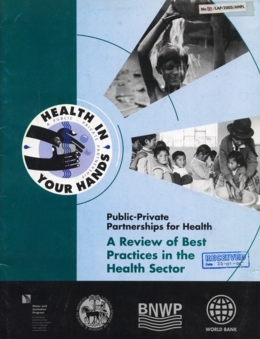Kategori Digilib
Public-Private Partnerships for Health: A Review of Best Practices in the Health Sector

Ann Thomas, Dr. Valerie Curtis
Washington DC, Water & Sanitation Program The World Bank, July 2003, 20 hal
Th. 2003
372.37 THO p
case studies, PPP-health
Perpustakaan AMPL, Telp. 021-31904113
1.705 kali
Public-Private Partnerships (PPPs) have evolved as a result of pressure to ensure quality in providing public services. PPPs pool public and private resources, and capitalize on the skills of the respective sectors to improve the delivery of services. Today, PPPs in the health sector focus on preventing diseases suac as sexually transmitted infections and malaria, developing and facilitating access to vaccines and drugs, and improving health service delivery. Whether international or national in scope, PPPs challenge the traditional distinction between the public and private sector, and their perceived aims and responsibilities.
Although a number of PPPs have benn established in the public health sector over the past few decades, little information is available on the necessary conditions leading to their formation. To address this need, this review has been prepared as a guide to best practices for PPPs in the health sector. It examines the underlying philosophy of PPPs, their costs, benefits, and impacts, as well as their governance, management, and implementation strategies.
The report draws on the experiences of six case studies of PPP initiatives, interviews with key players from the private and public sectors, and literature. The review offers general lessons of principle and process for forming partnerships and effectively managing them.
Contents:
Introduction
Are Public-Private Partnerships the new panacea
What are Public-Private Partnerships
The evolution of Public-Private Partnerships
Why join a Public-Private Partnerships
Philosophy and basic strategy
Lessons learned
Annex 1. Case Studies
I. Public-Private Partnerships to promote handwashing with soap in Central America
II. NetMark: Partnership to increase the use of insecticide-treated materials to prevent malaria
III. Partnership with condom manufactures to promote condom use in red light areas in Indonesia
IV. Partnership to increase the consumption of iodized salt in Pakistan
V. PHASE: Clean Hands, happy hands, hygiene promotion in schools
VI. The global alliance for Vaccines and Immunization
References
